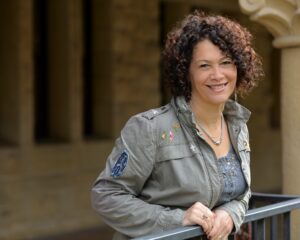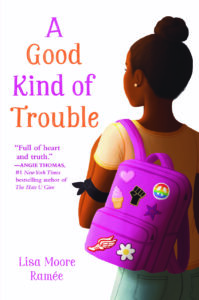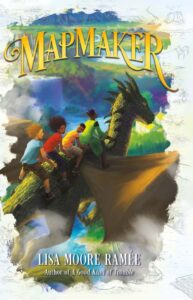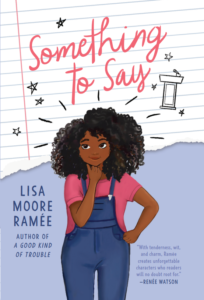 Lisa Moore Ramée was born and raised in Los Angeles and now lives in Northern California, with her husband, daughter, obnoxious cat, rambunctious dog and more yard than she can control. She earned a BA in Speech Communications from San Francisco State (go Gators!) and a MA in English Literature (focusing on Creative Writing) from Cal State East Bay. She worked for several years in publishing at the Walt Disney Company, first in Disney Comics, and then with Licensed Publishing. While there, she co-penned The Little Mermaid, Jr. Graphic Novel and the writing bug took up permanent residence. She is a devotee of Top Chef and Project Runway and would like to work either (or both) in a plot one day in order to be invited onto the shows as a guest judge. A Good Kind of Trouble, her first novel, received critical acclaim, garnered three starred reviews (PW, Kirkus and SLJ) and became a bestseller. It appeared on numerous “best of” lists for 2019. Something to Say received three starred reviews (Kirkus, SLJ and BookPage), was an Indie Next Pick and a Kirkus best of 2020 book. MapMaker was her debut fantasy middle-grade novel and she returns to contemporary fiction in 2024 with The Everybody Experiment.
Lisa Moore Ramée was born and raised in Los Angeles and now lives in Northern California, with her husband, daughter, obnoxious cat, rambunctious dog and more yard than she can control. She earned a BA in Speech Communications from San Francisco State (go Gators!) and a MA in English Literature (focusing on Creative Writing) from Cal State East Bay. She worked for several years in publishing at the Walt Disney Company, first in Disney Comics, and then with Licensed Publishing. While there, she co-penned The Little Mermaid, Jr. Graphic Novel and the writing bug took up permanent residence. She is a devotee of Top Chef and Project Runway and would like to work either (or both) in a plot one day in order to be invited onto the shows as a guest judge. A Good Kind of Trouble, her first novel, received critical acclaim, garnered three starred reviews (PW, Kirkus and SLJ) and became a bestseller. It appeared on numerous “best of” lists for 2019. Something to Say received three starred reviews (Kirkus, SLJ and BookPage), was an Indie Next Pick and a Kirkus best of 2020 book. MapMaker was her debut fantasy middle-grade novel and she returns to contemporary fiction in 2024 with The Everybody Experiment.
 Journey to publication
Journey to publication
My journey to publication was a long one! Back when I first started looking for an agent, you had to send hard copies with an SASE (self-addressed, stamped envelope). I would send out about five at a time and wait and wait and wait. Eventually the sad SASE would come back with a form letter saying basically thanks but no thanks. And then one day one of those form letters had a hand-written note scribbled on it saying “If still available, please send manuscript.” I knew success had finally come, and so I printed out the manuscript, and sent it, and waited and waited and waited and…never heard a word. Then social media came on the scene and I entered lots of contests that way. I made it into a few groups that were supposed to be roads to an agent, but not for me, sadly. I did notice though that when I participated in online pitch contests that even though I didn’t get an agent, I did get requests for pages, so I felt my idea was good, but my writing wasn’t quite there yet. It was time to swallow a whole lot of pride. So I did a ton of reading to see what successful authors were doing that I wasn’t. It was like a mini course in writing kidlit. I improved my writing, writing to sound more like an actual kid and less like the academic essays I had a lot of experience with. And finally, I started getting full requests from my queries and then a wonderful R&R (revise and resubmit). And ten years after starting to query, and more than a hundred rejections, I had eight agent offers! After so many years of rejection, it is unbelievable and wonderful to have people actually wanting to work with you. It was also terrifying. All the agents were fantastic. How to choose? Eventually I partnered with Brenda Bowen who had (and still has) a phenomenal reputation but also made me laugh. Brenda offered some slight revision notes and then we went on sub and a few weeks later, I got a text from Brenda that is still on my phone. An editor had gotten in touch to say she was reading and loving the manuscript and a few days later the offer came in. I still get tingles thinking about how that one yes changed everything. That book was A Good Kind of Trouble and it launched my career as an author.
Backstory
 When it takes as long to get an offer of representation as it took me, you start doubting your writing and yourself. You question whether the writing thing is really for you. One day I shared my frustration with a good friend and she asked me, “what would you write if you could write anything?” The answer came to me immediately: a book about making wishes. I don’t know what it is about wishes but they have always fascinated me. Maybe it’s because I grew up watching I Dream of Jeanie. I have practiced making my wishes to ensure if ever given the opportunity they would not go wrong. (But word to the wise–they always will go wrong.) I started drafting a book about a boy who finds a token that grants wishes and his first wish is to be able to travel anywhere he wants to go. That is definitely a wish I would make. But this kid, he loves to draw maps, so where he wishes to go is a world that he has created on a map. This was the beginning point of the book that became MapMaker. A book that is no longer about making wishes (although I did leave one or two in the story) but instead became more about figuring out who you are and standing up for yourself. Ironically, the whole thing about making wishes is about self-discovery too. When you ask yourself “what would I wish for?” your answer is going to reveal quite a bit about you! The thing that I love about this story of how MapMaker came to be is because I learned a valuable lesson as I worked on it. I think it is important to start with an idea/theme/concept that speaks to you because you’re going to spend a lot of time with it, but then don’t be afraid to drift from it if the story starts to grow in other directions. I also had to work harder on this book at the revision stage with my editor (the awesome Alessandra Balzer) than I had on my previous two books. It was maddening how I just couldn’t get it right. Fantasy is a beast! But through the struggle we ended up in a place I could never have imagined when I first started drafting. I’m so proud of MapMaker. But a disappointing part of its backstory, is it hasn’t done as well as I was sure it would. Blurbs I had banked on didn’t happen. I didn’t get invited to any key library conferences. And MapMaker came out right when Barnes & Noble was changing how they ordered middle grade. Talk about frustrating when you walk into a B&N and they have tables of shiny new middle grade fantasy and your book is nowhere to be seen. And trust me, I do get that it is a privilege to complain about low sales–at least I am getting published. Remembering that is a helpful salve. Working on another book is a better one.
When it takes as long to get an offer of representation as it took me, you start doubting your writing and yourself. You question whether the writing thing is really for you. One day I shared my frustration with a good friend and she asked me, “what would you write if you could write anything?” The answer came to me immediately: a book about making wishes. I don’t know what it is about wishes but they have always fascinated me. Maybe it’s because I grew up watching I Dream of Jeanie. I have practiced making my wishes to ensure if ever given the opportunity they would not go wrong. (But word to the wise–they always will go wrong.) I started drafting a book about a boy who finds a token that grants wishes and his first wish is to be able to travel anywhere he wants to go. That is definitely a wish I would make. But this kid, he loves to draw maps, so where he wishes to go is a world that he has created on a map. This was the beginning point of the book that became MapMaker. A book that is no longer about making wishes (although I did leave one or two in the story) but instead became more about figuring out who you are and standing up for yourself. Ironically, the whole thing about making wishes is about self-discovery too. When you ask yourself “what would I wish for?” your answer is going to reveal quite a bit about you! The thing that I love about this story of how MapMaker came to be is because I learned a valuable lesson as I worked on it. I think it is important to start with an idea/theme/concept that speaks to you because you’re going to spend a lot of time with it, but then don’t be afraid to drift from it if the story starts to grow in other directions. I also had to work harder on this book at the revision stage with my editor (the awesome Alessandra Balzer) than I had on my previous two books. It was maddening how I just couldn’t get it right. Fantasy is a beast! But through the struggle we ended up in a place I could never have imagined when I first started drafting. I’m so proud of MapMaker. But a disappointing part of its backstory, is it hasn’t done as well as I was sure it would. Blurbs I had banked on didn’t happen. I didn’t get invited to any key library conferences. And MapMaker came out right when Barnes & Noble was changing how they ordered middle grade. Talk about frustrating when you walk into a B&N and they have tables of shiny new middle grade fantasy and your book is nowhere to be seen. And trust me, I do get that it is a privilege to complain about low sales–at least I am getting published. Remembering that is a helpful salve. Working on another book is a better one.
 Positive impact or benefit of being an Amplify Cohort member
Positive impact or benefit of being an Amplify Cohort member
When I started this journey, social media wasn’t a thing–shoot cell phones weren’t even around! The idea of a writing community was completely foreign to me. Especially before I was published. I had no way to know if things I experienced were unique to me or not. I belonged to several writing groups but often I was the only Black person at an event. The first time I went to the SCBWI summer conference, out of hundreds of attendees, I saw three other Black writers. Being part of the Amplify Cohort was wonderful because through our regular meetups I got to hear about issues folks were having that I could relate to and made me realize that others were going through the same types of things I was experiencing. It was also great to learn from people with more experience and more time in the “game.” The simple fact of expanding my publishing friend group is so important. Going to conferences can be intimidating, especially when you don’t know too many people, so to be a part of the Amplify Cohort provides me with a group of people I can connect with and not feel alone. And maybe one of the best things is being able to cheer on such awesome writers and illustrators. It is so meaningful to connect in that way and know we have each other’s backs for all the good times and yes, the unfortunate lows too.
Learn more about Lisa Moore Ramée on her website: lisamooreramee.com
